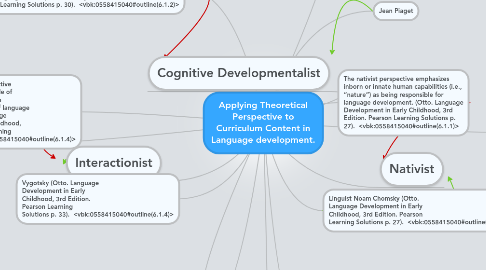Applying Theoretical Perspective to Curriculum Content in Language development.
by Christin J. Harrison

1. Behaviorist
2. Cognitive Developmentalist
3. The cognitive developmental perspective is based in the work of Jean Piaget (1955). The emphasis of this perspective is that language is acquired as maturation occurs and cognitive competencies develop. (Otto. Language Development in Early Childhood, 3rd Edition. Pearson Learning Solutions p. 30). <vbk:0558415040#outline(6.1.2)>
4. Interactionist
5. BF Skinner
6. The interactionist perspective focuses on the primary role of sociocultural interaction in children's development of language knowledge (Otto. Language Development in Early Childhood, 3rd Edition. Pearson Learning Solutions p. 33). <vbk:0558415040#outline(6.1.4)>
7. Vygotsky (Otto. Language Development in Early Childhood, 3rd Edition. Pearson Learning Solutions p. 33). <vbk:0558415040#outline(6.1.4)>
8. Activity that includes group participation focus on social interaction with peers
9. Activity that has visual representation so the children can create a symbolic connection such as having fruit on hand to pass around taste and so on when learning the names of these fruits.
10. Activity for cause and effect that show consequences both positive and negative focus on operant conditioning
11. Linguist Noam Chomsky (Otto. Language Development in Early Childhood, 3rd Edition. Pearson Learning Solutions p. 27). <vbk:0558415040#outline(6.1.1)>
12. Nativist
13. The nativist perspective emphasizes inborn or innate human capabilities (i.e., “nature”) as being responsible for language development. (Otto. Language Development in Early Childhood, 3rd Edition. Pearson Learning Solutions p. 27). <vbk:0558415040#outline(6.1.1)>
14. Activity is to use story's and allow the children to draw and write.
15. The behaviorist perspective emphasizes the role of “nurture” and considers learning to occur based on the stimuli, responses, and reinforcements that occur in the environment. A child is considered to be a “blank slate” (Karmiloff & Karmiloff-Smith, 2001), and learning occurs due to associations established between stimuli, responses, and events that occur after the response behavior. Language is learned as a result of these associations (Otto. Language Development in Early Childhood, 3rd Edition. Pearson Learning Solutions p. 31). <vbk:0558415040#outline(6.1.3)>
16. Jean Piaget


